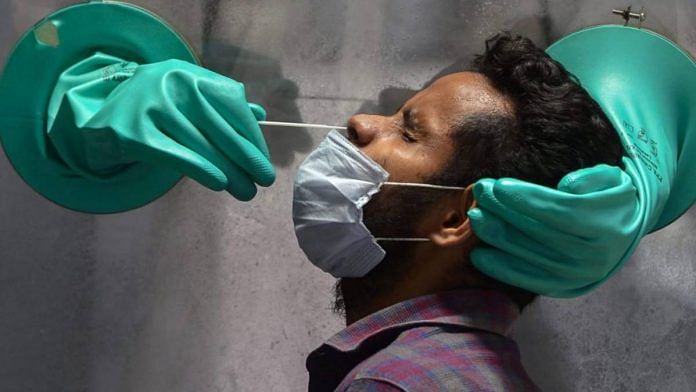New Delhi: A study by the Indian Council of Medical Research-National Institute of Virology (ICMR-NIV), Pune, has found faeces of Covid patients to be a potential source of transmission of the novel coronavirus.
The study, to be published in the June issue of the peer-reviewed Indian Journal of Medical Research, was released online Tuesday. According to the researchers, the study showed “consistent person-to-person transmission of this novel coronavirus in hospital and family settings and also prolonged viral excretion by COVID-19 patients after negative conversion of pharyngeal swabs.”
This means that the virus was present in the stool of the patient even after he had recovered from the disease and tested negative for Covid.
Researchers said that the findings “may have important public health implications.”
Titled ‘Transmission of COVID-19 infection within a family cluster in Pune, India‘, the study was a part of hospital-based research initiated at ICMR-NIV to investigate SARS-CoV-2 shedding in excreta of Covid-19 patients, during treatment and after recovery.
The researchers studied a family of four, where the index patient was a 37-year-old male, healthcare worker. The patient, who lived with his 34-year-old-wife and two children, aged eight and six years, had been working in the Covid ward of a hospital. While the healthcare worker had been the first to be infected, all three family members too subsequently tested positive for Covid and were observed as part of the study.
“The presence of SARS-CoV-2 RNA was demonstrated in the faeces of COVID-19 patients and suggested the possibility of SARS-CoV-2 transmission via the faecal-oral route,” the study explained, while adding that further research is needed to ascertain if this would be a possible route of transmission.
The most common way of such transmission is due to improper hygiene, such as not proper washing of hands after using the toilet. In such a scenario, when the infected person touches any other surface after using the lavatory — a doorknob for example — the virus gets transferred from his hands to that surface. When others touch that surface, they are at risk of picking up the virus, and may get infected if they touch their eyes, nose, or mouth before washing their hands.
Transmission may also happen through the use of shared lavatories.
Interestingly, the study found no presence of the virus in the patients’ urine samples.
Also read: Why Covid drug Ivermectin remains popular despite warnings & lack of evidence on efficacy
How study was conducted
Though the study does not mention the period during which it was done, it was submitted for review in August last year.
Being a healthcare staff, working in a Covid ward, the 37-year-old — who was the index patient in this case — had been exposed to multiple Covid positive patients.
He was admitted to the hospital after he developed fever, nasal discharge and weakness and subsequently tested positive for Covid. On the fourth day of his onset of symptoms, his wife developed a sore throat and rhinorrhoea (runny nose).
After she and the couple’s two children too tested positive for Covid, the three were admitted to the hospital on the sixth day of onset of symptoms in the index patient.
“Both the children were asymptomatic throughout the disease. An asymptomatic case was defined as a laboratory-confirmed COVID-19 infection case who was afebrile (non-feverish) and well,” the study noted.
While the wife had mild symptoms, the healthcare worker had more severe respiratory symptoms.
All family members were discharged from the hospital by day 14 of the admission of the index patient.
Stool and urine samples were collected of all four patients on admission, to check if the virus could be detected in specimens from non-respiratory sites and 14 days after collection of the first specimens (based on the incubation period of the virus).
“Additional stool samples were collected of the index patient on days 21, 32, 40, 48 and 55, since the onset of symptoms, to determine the duration of excretion of this novel virus in faeces.”
Also read: Why Covid variants seem to appear in Maharashtra first
Virus detected in faecal samples, but not in urine
Researchers found that the viral RNA (ribonucleic acid, which is the genetic material of a virus) was not detectable in urine samples of the patients. However, they said, improved methods of testing urine samples are needed.
“A rather surprising finding from the study was detection of viral RNA from the faecal specimens of the patients, though none of them had diarrhoea as part of their symptoms,” the authors wrote.
What this means is that while the presence of the virus in the patients’ stool meant it had reached the body’s gastro lining, it still didn’t cause diarrhoea, which is also one of the symptoms of Covid.
The study was authored by Sujata Ranshing, Mallika Lavania, Varsha Potdar, Sampada Patwardhan, Parikshit S. Prayag, Sameer Jog, Dhananjay Kelkar, Pradeep Sawant, Manohar Shinde and Nutan Chavan. While Ranshing, Lavania, Sawant, Shinde and Chavan are from Enteric Viruses Group, ICMR-National Institute of Virology, Potdar, Prayag and Patwardhan are from the National Influenza Centre, ICMR-National Institute of Virology, Pune. Jog and Kelkar are from Deenanath Mangeshkar Hospital & Research Center, Pune.
(Edited by Poulomi Banerjee)
Also read: AstraZeneca vaccine could be less effective against Delta variant: Scotland study in Lancet



